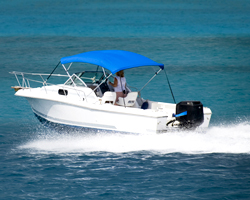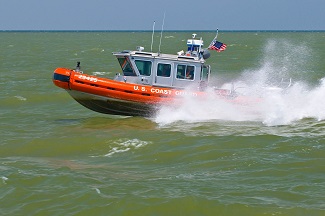About the Clean Boating Act (CBA)
Background
Why is the EPA regulating recreational boaters?
The CBA requires nationally applicable, reasonable measures to mitigate adverse impacts of recreational vessel discharges without using a Clean Water Act permit.
What is a recreational vessel?

A recreational vessel is a vessel that is manufactured or used primarily for pleasure and is not for commercial use or the transport of paying passengers. For example, canoes, kayaks, in/outboard motor boats, personal watercraft, yachts and sailboats may all be considered recreational vessels.
What are management practices?
Management practices include methods, techniques, or tools which, when used correctly, can mitigate the adverse environmental impact of discharges from recreational vessels into our waters. Recreational boaters are responsible for applying the appropriate management practices for each type of discharge their vessel creates.
Scope
What does the CBA regulate?
The CBA regulates discharges incidental to the normal operation of recreational vessels.
What is the jurisdiction of the CBA?
The CBA applies to recreational vessels in all "waters of the United States," as defined in the Clean Water Act, and waters of the contiguous zone which extend to 12 miles from shore. This means the CBA applies to recreational vessels using internal waters, coastal waters and waters out to 12 miles from shore.
Who is affected by the CBA?
The CBA affects owners or operators of recreational vessels, from the smallest kayak to the largest yacht. Each such vessel owner/operator may be responsible for implementing the management practice(s) associated with each type of discharge that their vessel creates.
Why does this action affect only discharges from recreational vessels and not from other types of watercraft?
Vessel discharges not covered by the CBA are regulated through other rules and regulations, including the Uniform National Discharge Standards and the Vessel Incidental Discharge Act.
Who enforces the CBA?

The United States Coast Guard (USCG) has enforcement authority under the CBA. In addition, states may choose to enforce the CBA through appropriate state agencies.
Does the CBA override existing state or local regulations?
While the CBA will establish a nationally-applicable set of management practices, state and local governments may establish practices that are broader in scope and/or more stringent than those established under the CBA. Vessel owners must comply with the most stringent laws.
Compliance
Will EPA charge boaters a fee under the CBA?
EPA will not charge or collect any fees from boaters under the CBA.
How much will complying with this new regulation cost me?
Compliance costs will vary depending on vessel type, usage patterns, maintenance practices and the types of vessel discharge produced. EPA will complete an economic analysis which estimates the incremental financial burden to recreational vessel owners for compliance with the management practices.
Will there be any resources available to help me bring my boat into compliance?
At this time, there are no compliance resources available. However, EPA plans a variety of outreach projects to educate recreational boaters about their responsibilities under the CBA to help ensure compliance.
What are the penalties for breaking these laws?
Penalties will be determined under existing Clean Water Act penalty provisions. More information will be available when the USCG (the agency responsible for enforcing the CBA) finalizes implementing rules.
Is EPA planning to impound boats?
EPA does not impound boats. The USCG is the enforcement agency. Additionally, state agencies can, at their discretion, enforce these practices.
Implementation
When will the CBA affect the recreational boater?
The CBA has three phases of implementation:
Phase 1: EPA will determine the discharges incidental to the normal operation of recreational vessels for which it is "reasonable and practicable" to develop management practices and develop these practices.
Phase 2: EPA will enact regulations establishing performance standards for each management practice.
Phase 3: USCG will enact regulations that specify the design, construction, installation or use of management practices to meet EPA's performance standards.
How does the CBA affect the recreational boater?
After all phases of implementation are complete, recreational boaters will be required to carry out the management practices.
Discharge Pollutants and Management Practices
What kinds of management practices are recreational boaters supposed to use?
EPA is considering developing management practices for several broad categories of vessel discharges (e.g., release of antifouling and corrosion control agents, transport of aquatic nuisance species, bilgewater, cleaning and maintenance related discharges, fishing waste and graywater). A list of the management practices will be made available when EPA publishes the proposed rule.
Why is EPA regulating recreational vessels when there are other more potentially significant sources of pollution?
Research has shown that recreational vessels can play a role in the transportation of aquatic nuisance species (ANS) between bodies of water, which represent a very serious disruption in aquatic environments. In addition, discharges from vessels sometimes contain environmentally harmful concentrations of pollutants.
Does the CBA regulate sewage discharges from vessels?
No. The CBA states that EPA's management practices for recreational vessels will not apply to sewage. Vessel sewage is currently regulated under the Clean Water Act. To read about vessel sewage discharges, click here.
I’ve been told that I will be required to retrofit my boat to install graywater holding tanks and/or graywater treatment equipment. Is this true?
EPA does not currently intend to propose graywater management requirements of this nature.
Does the CBA require the use of E15, or otherwise address ethanol blended fuels?
Fuel, including ethanol content in gasoline, is regulated under the Clean Air Act. The CBA does not require the use of E15, or otherwise address ethanol blended fuels.
Will the CBA regulate pump-out facilities?
No, the CBA does not regulate pump-out facilities. Historically, marinas operating recreational vessel pump-out facilities receive grant funds, via state programs, that have been made available from the US Fish and Wildlife Service's Clean Vessel Act program. Adequate facilities for safe and sanitary removal and treatment of sewage are a prerequisite to EPA approval of state "no discharge zones" for vessel sewage under Clean Water Act section 312(f)(3), but such pump-out facilities are not addressed by the CBA.
